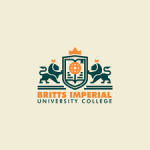
Britts Imperial University College
Job description
THIS POSITION REQUIRES FOR THE INDIVIDUAL TO RELOCATE TO RIYADH WITH HELP OF COMPANY BENEFITS & SPONSORSHIP.
Key Responsibility Areas (KRA) for IT Faculty
Job Type: Full-Time
About Us -At Britts Imperial Education Group UAE, we value creativity, collaboration and innovation and look forward to welcoming a new team member who shares these values. We strive to promote diversity and inclusivity and invite individuals from all backgrounds to apply.
The BIG Academy offers International Certification and Higher Education programs that have migration pathways for Partnered Universities in the US, Canada, France, and Australia for our students.
Britts Imperial College, UAE is an Academic Centre & Education Partner of four top-tier globally recognized British & European universities to offer Undergraduate, Postgraduate and Doctoral degree programs awarded by these universities to aspiring learners from across the globe.
Kindly refer to our website for more details
Our websites -https://www.thebigacademy.com/
1. Instructional Delivery for IT Courses
Deliver high-quality lectures and training sessions on IT modules, including both theoretical and practical components, for programs aligned with UK qualifications.
Ensure that instructional delivery is consistent with UK Diploma standards, maintaining rigorous academic quality.
Provide training on emerging technologies such as Artificial Intelligence, Data Science, and Cybersecurity, tailored to the requirements of current IT industry trends.
2. Curriculum Design and Content Development
Assist in the development and localization of course materials and content, ensuring alignment with UK qualification standards and the specific needs of the Saudi campus.
Regularly review and update course materials, integrating emerging technologies and industry best practices to keep content relevant and engaging.
Develop learning resources, including study guides, practical lab exercises, and project assignments, to support varied learning styles.
3. Assessment and Evaluation
Design and implement assessments (assignments, quizzes, exams) that evaluate student understanding and practical application of IT concepts.
Grade student assessments accurately and provide constructive feedback to support learning and improvement.
Monitor student progress and adapt instructional methods to support diverse learning needs and improve overall performance.
4. Student Mentoring and Support
Provide academic mentorship and support to students, addressing any learning difficulties and providing additional resources when needed.
Assist students in developing project-based learning activities to enhance their understanding of practical applications of emerging technologies.
Maintain regular office hours and be accessible to students for additional guidance, ensuring a supportive learning environment.
5. Practical Training and Workshops
Conduct hands-on workshops and lab sessions, particularly in emerging technologies like AI, Data Science, and Cybersecurity.
Facilitate practical training to equip students with industry-relevant skills, focusing on real-world applications and project-based learning.
Organize and lead seminars or guest lectures featuring industry professionals to provide insight into cutting-edge developments in IT.
6. Professional Development and Research
Stay updated with emerging trends and developments in IT education, particularly in AI, Data Science, and Cybersecurity.
Engage in continuous professional development through attending workshops, seminars, and conferences to enhance teaching methodologies.
Conduct or contribute to research initiatives that support the growth of the IT department and enhance the reputation of the Saudi campus.
7. Integration of Emerging Technologies
Integrate cutting-edge technologies into teaching and learning activities to ensure students gain exposure to industry practices.
Develop practical scenarios and case studies that leverage emerging technologies to help students understand their applications in the industry.
Use innovative teaching tools and techniques, such as simulations, virtual labs, and AI-powered learning platforms, to enhance the educational experience.
8. Collaboration with Academic Teams
Work closely with curriculum designers and academic leaders to enhance program offerings and ensure alignment with UK standards.
Participate in regular academic meetings to align course objectives, teaching methodologies, and institutional goals.
Share insights and provide input on improvements and innovations that can enhance the overall IT curriculum.
9. Quality Assurance and Compliance
Ensure compliance with all academic standards related to UK qualification frameworks.
Maintain thorough records of teaching activities, assessments, and student performance to support institutional quality assurance.
Participate in quality audits and accreditations to ensure all training aligns with institutional goals and regulatory requirements.
10. Stakeholder Engagement
Engage with industry partners and stakeholders to keep course content relevant and aligned with industry needs.
Collaborate with students, faculty, and administrative teams to ensure that academic goals are met and exceeded.
Contribute to the Saudi Campus’s visibility and engagement through public lectures, community outreach, and workshops.
Key Performance Indicators (KPIs):
Student Performance: Improvement in student grades and successful application of skills in projects and practical assessments.
Teaching Quality: Feedback from students regarding the quality and effectiveness of lectures and training sessions.
Content Relevance: Degree of integration of emerging technologies in the curriculum and the ability to keep content updated.
Assessment Effectiveness: Quality and fairness of assessments in evaluating student competencies.
Student Engagement: Positive feedback on student engagement, measured through attendance, participation, and completion of practical exercises.
Professional Development: Participation in workshops, seminars, and completion of activities aimed at teaching improvement and subject knowledge enhancement.
Compliance and Standards: Adherence to academic standards for UK qualifications, verified through internal audits and quality assessments.
